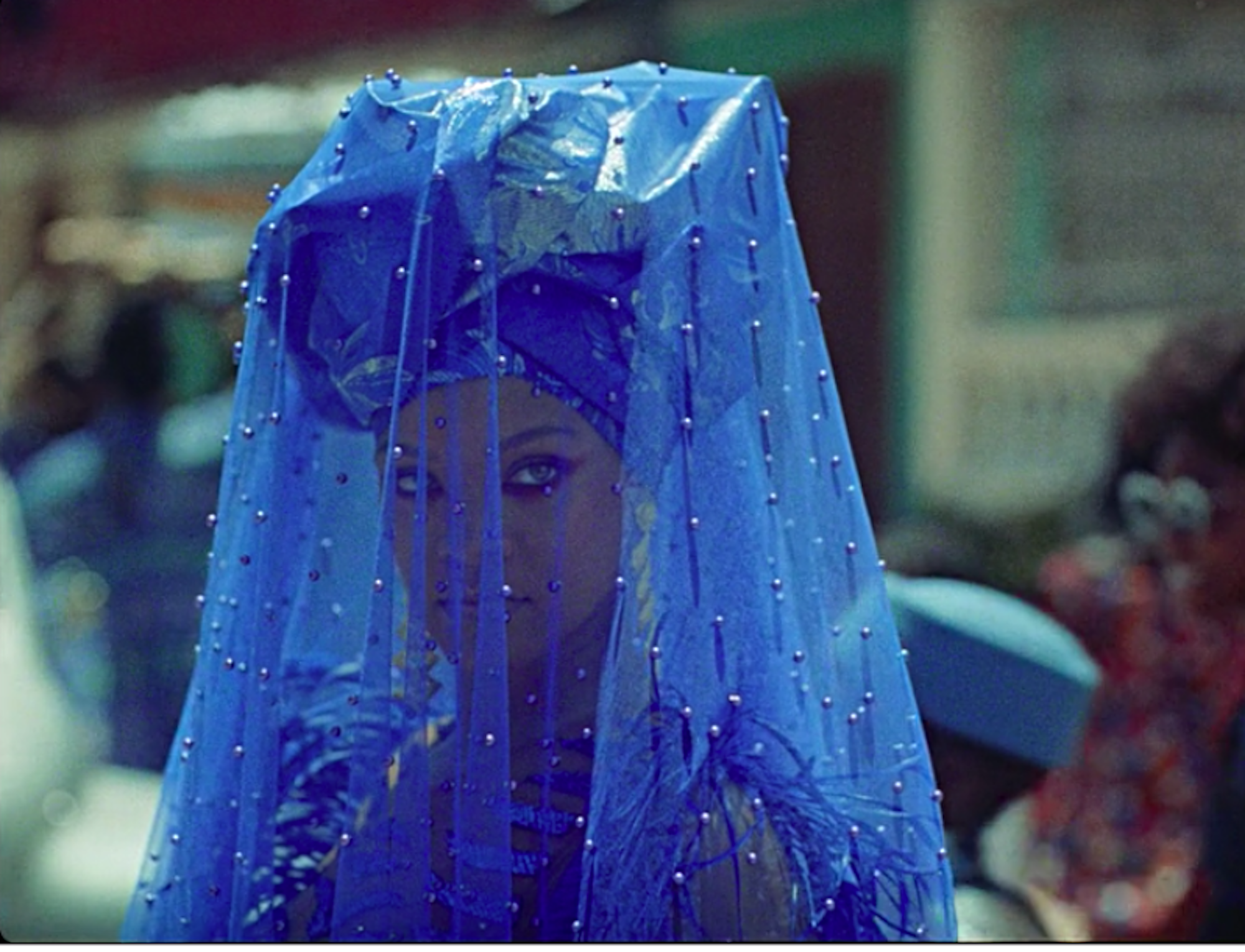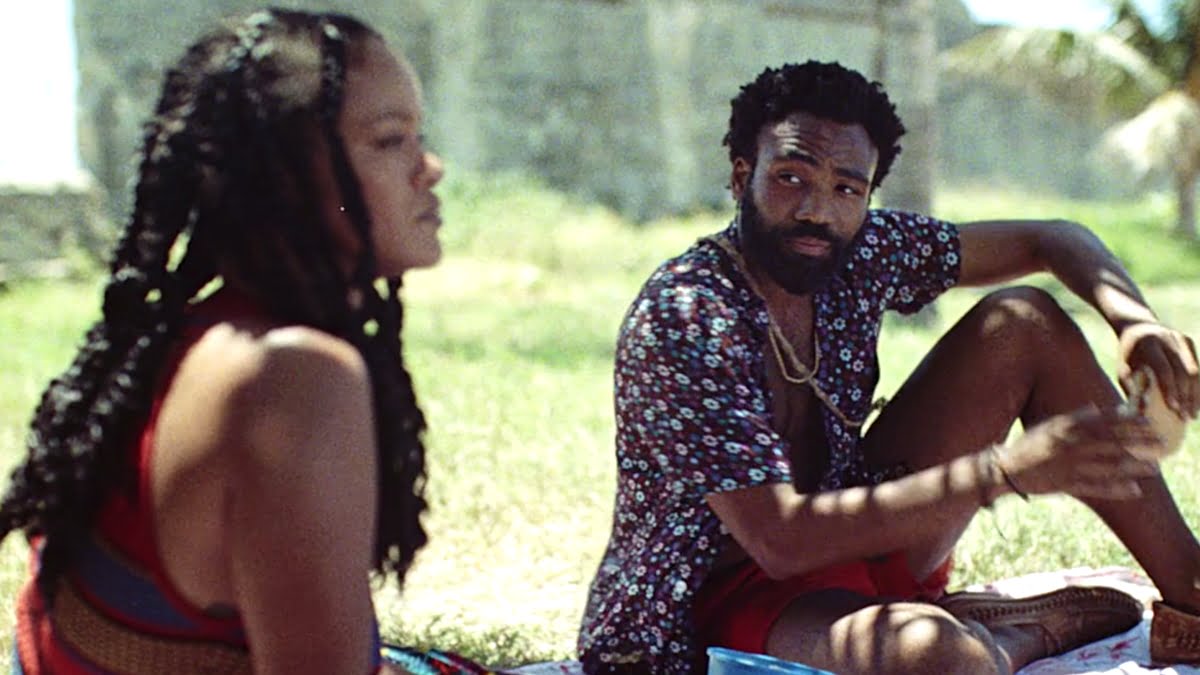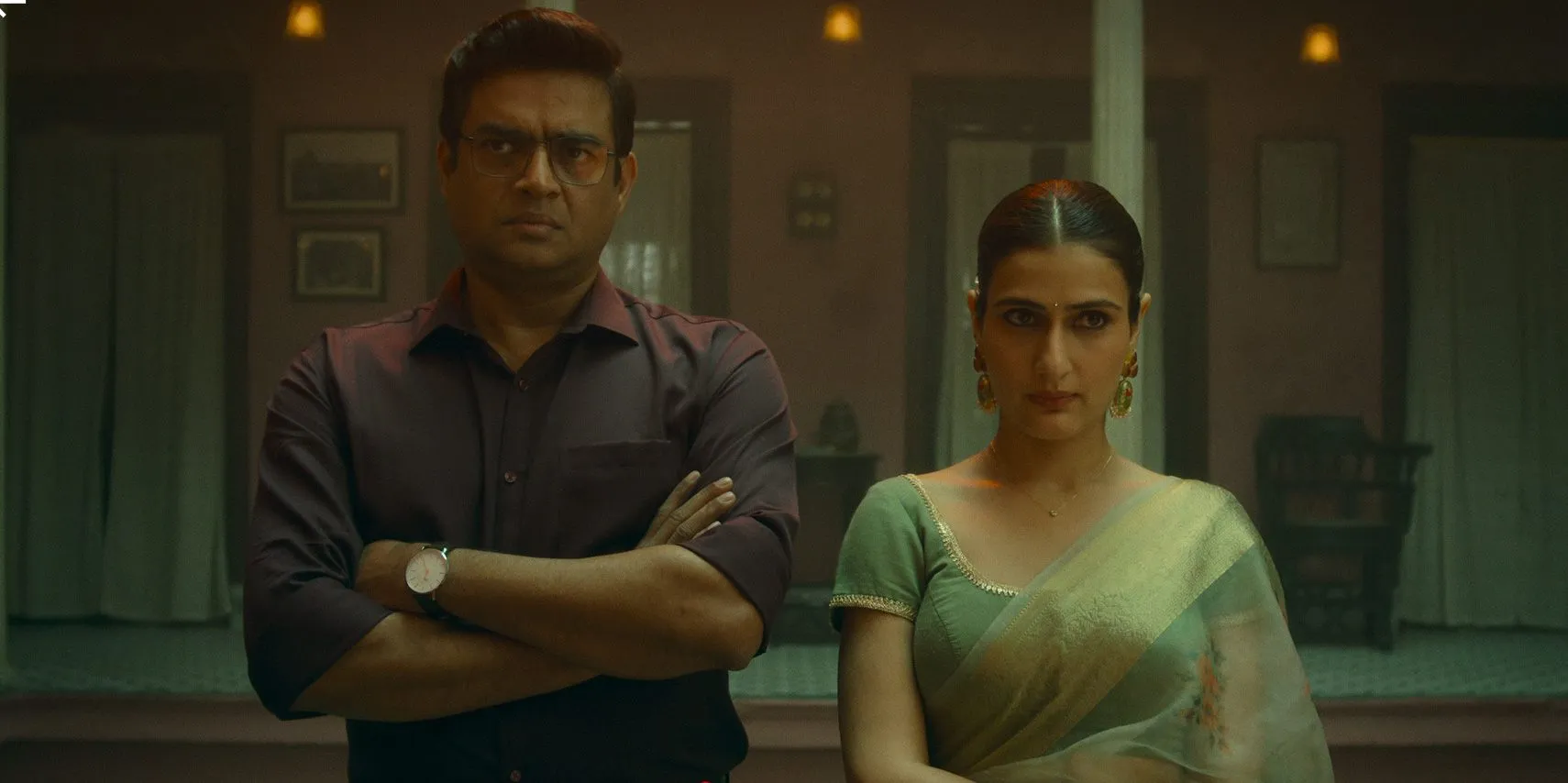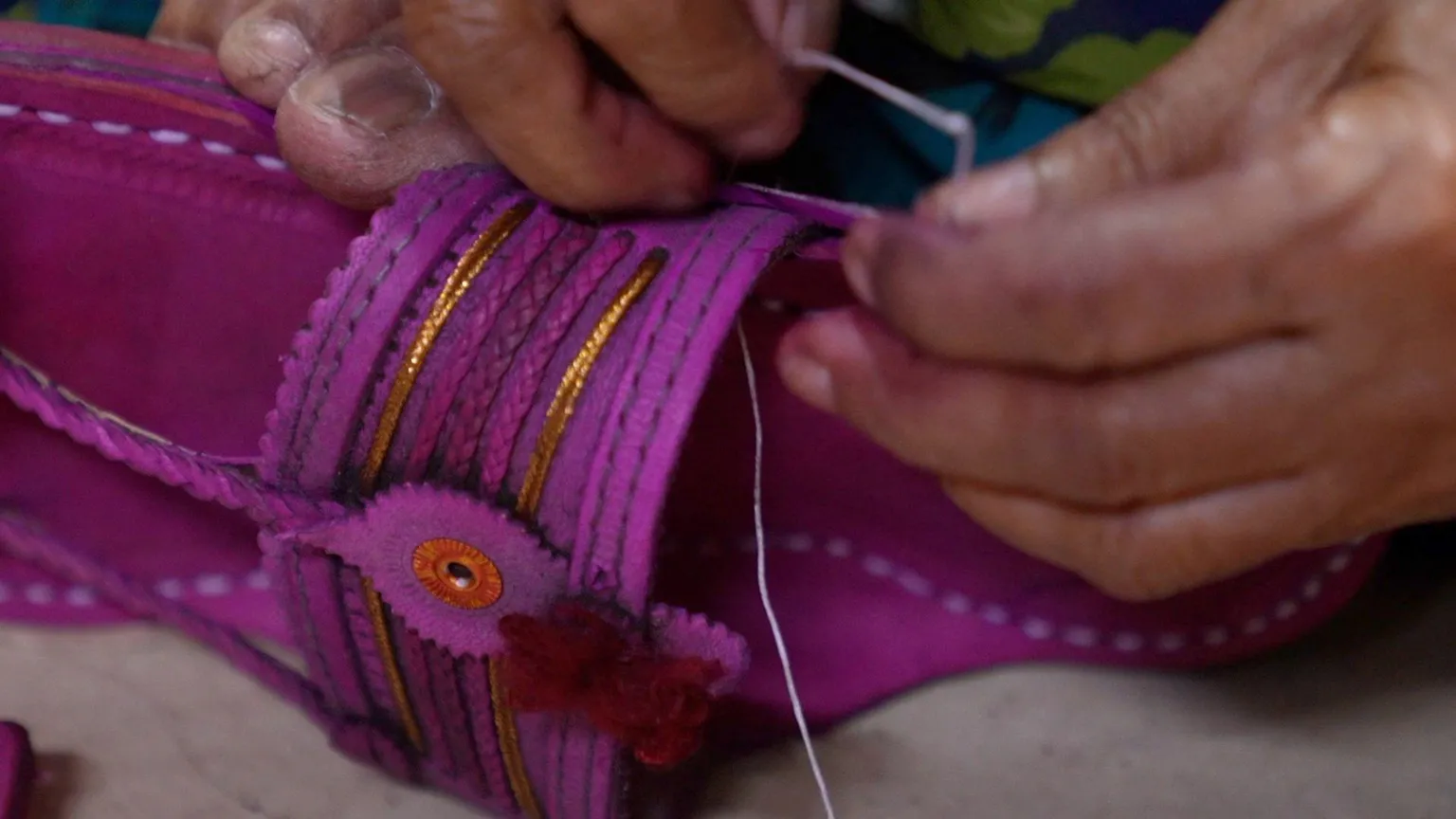Guava Island, a 2019 film by Hiro Murai depicts the beautiful journey of demanding leisure time by Black workers in the Guava Island. A beautiful imaginary land of Blacks, starts with animated notes narrating the history of the island by Kofi (a young mother narrating the story to her daughter). The use of Kofi’s voiceover in Guava Island in narrating the whole story underlines the importance of story-telling and story-tellers, which depict Black history to us. The island is shown to have been dominated over a period of time for its rich resources; a rare blue silk particular to that island, by American capitalists who captured the island selling them the fraudulent dream of hard work and success.
The beginning of Guava Island spoke about the grave history of the slave-making process of the Black society, and the development of the plot of the film further reflects on how the idea of imagination and a sense of community is fractured by using a Black mediator as the villain. The film does not show any physical presence of the White colonial oppressor but uses Black people from the community who are designated by the White masters to execute oppression.
The beginning of Guava Island spoke about the grave history of the slave-making process of the Black society, and the development of the plot of the film further reflects on how the idea of imagination and a sense of community is fractured by using a Black mediator as the villain. The film does not show any physical presence of the White colonial oppressor but uses Black people from the community who are designated by the White masters to execute oppression. The narrator thus hold a strong character not only describing the story but provides the essence of their struggle, ways of recognising oppression and resistance it which is probably un-written history, thus passes to its younger generation in oral form. The climax of Guava Island establishes who the narrator is and why she is important in passing the history of one generation to another which she mentions in the beginning of the film; that she has heard the story from her mother, and which is shared to her mother by her grandmother.

Guava Island is directed by Hiro Murai (as a debut director). Its leading character is played by Donald Glover as Deni Maroon, who is a Cuban musician determined to throw a late night musical concert on Saturday night for his island community who are mandated to work every day for mere profit. Rihanna as Kofi Novia, plays the role of Deni’s girlfriend but also the narrator of the story that Guava Island revolves around. The musical concert is symbolically meant to provide some ‘rest’ and ‘leisure’ to their island people from Red Cargo, a shady island tycoon whose business interest is only to make profit by making the island people work everyday without any break. Red Cargo played by Nonso Anozie tries to stop Deni’s concert and also tries to stop people from joining him in learning music to enjoy their free time.
Rejecting The “Lazy Native” Narrative
Guava Island is unique in many ways in rejecting the mainstream idea of Black life. It critiques the life and meaning which is controlled by White imperialism and their objective ideas of ‘productive’ and ‘unproductive’ life; money making as the only happiness that consumers are captured by in the capitalist’s terms, which also controls their basic ‘time’ and ‘energy’. The story begins with its story-teller, unravelling slowly the America’s development agenda. She talks about Deni, who dreamt of ‘freedom for the island’ from the capitalist mindset of a business man like Red Cargo. Romantic in tone, and uses of musical prose in the 55-minute film are well-woven to lead a journey for the audience to see a remote enchanted world of beauty and water portrayed by a beautiful setting of small but cozy houses, streets, factories where everybody knows everybody.
The musical tour in Guava Island transcends the audience and connects them with the Islands, in addition to the islanders amidst the rough working hours and heavy loads of pressure inside the factory waiting to listen to Deni on radio. The use of radio as they wait for the guards to be out for a pee-break brings to us the hostile work condition of that islanders. However, they managed to find means to have their small break and shares their daily chit-chat in those breaks of guards in the factory.
The title of the film is cleverly chosen as ‘Guava Island’, a symbolic idea of using a ‘fruit’ name which can also means ‘prosperity’. When the hero of the film states that he wants to “unite the people of the island, a song that would remind us of the magic Guava had”, this constitutes the film’s critical plot.
The title of the film is cleverly chosen as ‘Guava Island’, a symbolic idea of using a ‘fruit’ name which can also means ‘prosperity’. When the hero of the film states that he wants to “unite the people of the island, a song that would remind us of the magic Guava had”, this constitutes the film’s critical plot.
Leisure As A Tool Of Resistance
Guava Island is screened as a musical journey presenting the need of leisure where ‘music’ used as a ‘tool of resistance’ and used as a plot to interrogate the capitalist way of slave making. It has also used ‘time’ as a prop in describing how the capitalist system overtakes its worker’s life and even heavily occupies their mind. They are on the verge of becoming and acting like robots, functioning only through the dictator’s command of ‘yes-doing-work’, except for the few islanders who believe in Deni’s dreams for the island and for its people to stop for a while and go-slow and enjoy the time they pass in the beautiful serene world they are in.
In Guava Island, Deni’s desire is to hold a cultural evening showing the Blacks’ rich culture which is otherwise dominated by the “superior” Whites’ tradition and culture, served to the world as sophisticated and universal. Deni’s embodiment of a musician who is ‘slow’, and always a ‘lazy’ guy, is actually reflective of the treatment received by Black artist folks or the attack upon their creative world. His portrayal is of a composer and a musician acting as an activist, and thus rejecting anything that western structure of domination tries to inject. But if we look into the life of Deni, we could see his works: teaching music to children, hosting a musical concert to entertain islanders, radio-jockeying in a local radio channel as if he is a healer in the island.

Yes, this work never pays him well. Instead he is depicted by the director as a fulfilling character who always enjoys company of the young and teenagers in the island, composes music for his girlfriend, and never picks a fight. Therefore, he breaks the stereotypes of divisions of labor, reshaping masculinity, sharing responsibility for his community, composing song for his girlfriend Kofi and staying at her place, thus rejecting the narratives propagated by the White patriarchy in the West and Brahminical patriarchy in India.
Rejection Of The American Dreams
To the fellow worker who dreams of America where he would go one day to open his independent business with the money that he is earning from this hard labour in Guava island, Deni says, “We live in paradise but none of us have the means to actually live here,” The scene is so beautifully depicted where Deni sings the song “This is America” from the original song composed and screened by Donald in 2018. It catches the eye of audience that understands Black history, and sympathizers of Blacks who are caught in the violence game by the American government. The song here is used with small changes in lyrics and the setting inside a factory, where Deni dances with his fellow workers.
American capitalist dream is fraudulent and violent in nature – it is violent to its workers, violent to the worker’s family, and dries youth subculture. The setting of the film is arrival of modernity where people within questions unequal distribution of resources and labour and emphasised on the important of leisure. Chris Rojek in Capitalism and Leisure Theory (1985) speaks about leisure as that which cannot be understood as “free time” and here in Guava Island the concept reflects its attachment to the understanding of resources and labour. Capitalism functions to reject the culture of the marginalised, which in turn changes the meaning of leisure.
The struggle for leisure depicted in Guava Island is a reflection of the struggles that the Black people or the marginalized people go through in their everyday life. The film is an unapologetic attempt by the director to focus on what a Black person can do!
Narrator As A Black Feminist
Towards the end of Guava Island, the relationship of Black women with the movement, with their work life, the resistance politics they followed is also depicted. Kofi’s character is the narrator in Guava Island and like all narrators and creators, know how the story will end. She is cautious to the present reality of the domination by the White people. She could see the potential of Deni in singing and composing music even in their childhood. The highest point of Guava Island is how Kofi replied to Red Cargo, when the whole group of islanders got their leisure day on Sunday. The struggle for leisure depicted in Guava Island is a reflection of the struggles that the Black people or the marginalized people go through in their everyday life. The film is an unapologetic attempt by the director to focus on what a Black person can do!
Featured Image Source: Esquire.com
About the author(s)
Dona Biswas is pursuing her PhD in Women and Gender Studies from Ambedkar University Delhi. Her research interests include gender, caste and migration, women’s movement and women in movement, North-East Studies.





Your Reviews Look genuine… I Like it..